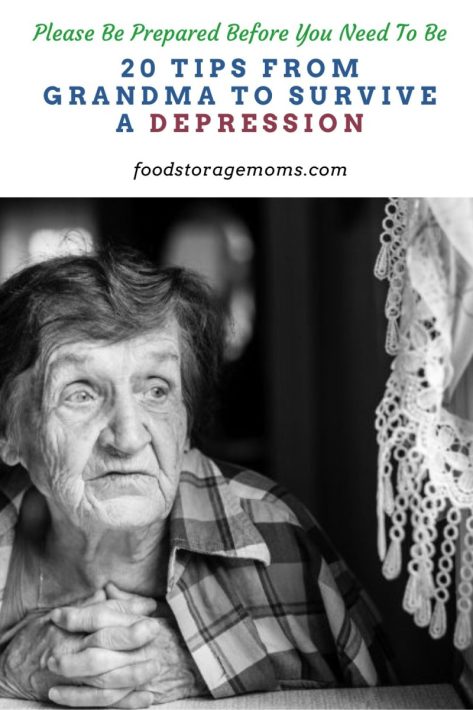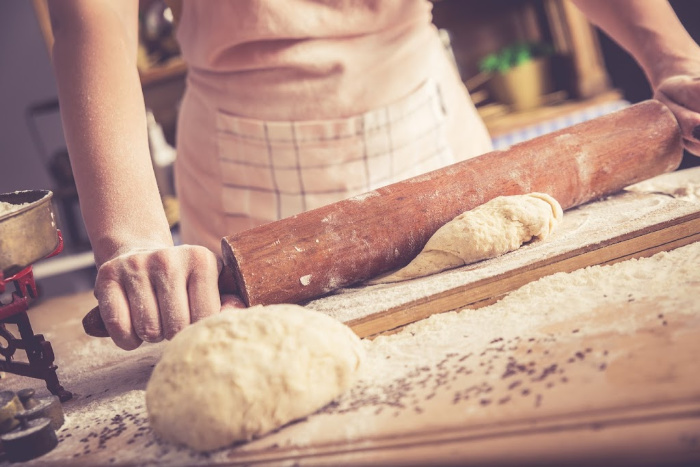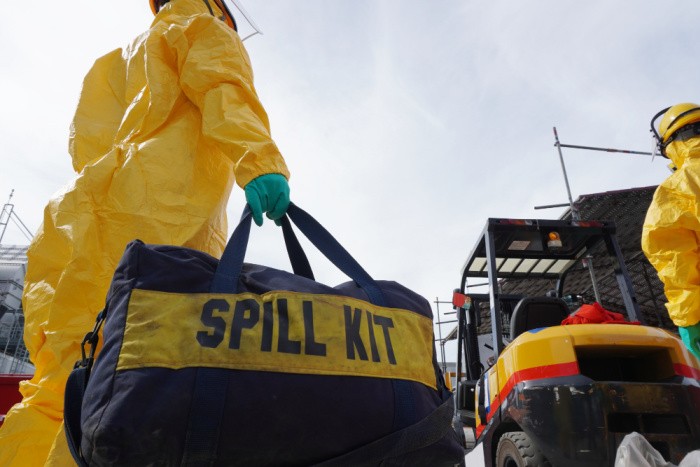20 Tips From Grandma to Survive A Depression
Today, I have 20 tips from grandma to survive a depression. We need to be ready, my friends. Have you ever sat down with your grandparents or great-grandparents and listened to their stories of how they survived the Great Depression?
If you have, you’ve probably learned many ways of coping if a certain financial catastrophe were to happen again. I keep updating and adding to this post. Things seem to be getting worse every year.
Maybe you don’t have a family member still alive who went through those, or similar, tough times. You may have no personal knowledge of what to expect and where to start as you try to be self-reliant and prepare for financial challenges.
Here are 20 tips from grandma to survive a depression. She would share these tips with you regarding how her family survived the darkest of times.
Some of My Favorite Tools:
- 11-Inch Danish Whisk
- Mixing Bowls
- 12-inch Cast Iron Pan
- Measuring Cups
- 2 Cup OXO Measuring Cup
- Measuring Cups & Spoons
- One-Pound Bread Pans

Survive A Depression
1. Use Every Resource
Our grandparents who survived the depression found ways of using every resource available. Today, when a pair of shoes become very worn, we think nothing about trying to make them work and we just throw them out.
During an economic collapse, you might not have that option. You may find yourself preserving resources by repairing them, if possible, instead of buying new ones.
Mark’s parents were married in the spring of 1929, so they were just getting started together when Wall Street experienced the stock market crash, banks were failing due to people pulling deposits during a bank run, and investors lost all hope their investments would survive the free fall.
I remember watching Mark’s mom gather the paper napkins after dinner for use next time, as long as they weren’t too soiled. They tended to keep their cars for longer than I was used to seeing, and although they loved family vacations, they always planned trips by car rather than flying. His parents were used to watching every penny, yet they seemed happy and content.
2. Steer Clear from Debt
Those who’ve been through recessions would advise you to stay out of debt. If you are already in over your head in debt, put a plan together to try and get out as quickly as you can. While the lenders at big banks currently might be more lenient, when the economy takes a hit, they’ll be less forgiving because you won’t be the only ones looking for relief.
Do all you can to prevent having to file for bankruptcy. If you have a loan on your home, make sure payments are made on those mortgages since that’s a sign you are sincerely trying, and you don’t want to put your shelter at risk. Even though you may be feeling some real financial pressure, do your best to get back on top, and don’t panic.
3. Start Saving Now
Having money tucked away in anticipation of a financial emergency, and making sure you add to it as often as possible, will be huge. Start saving any money that you can NOW so you’re better prepared when a crisis hits.
There are all sorts of financial instruments to consider, from bank savings and certificates of deposit, the commercial and government bond market, mutual funds, or even the stock market if you feel comfortable doing so. The stock market has seen some hits this year, so stay away from industries that show systemic risk.
You hear a lot about Cryptocurrencies these days. I’d steer clear until that market is more stable and not subject to the scams we hear about in the news. The government’s financial regulators really haven’t taken on that market at this point, so buyer beware.
4. Learn to Improvise
During the ‘Great Depression,’ many Americans had to learn how to adapt, and do so quickly, I might add. You shouldn’t keep pretending life is going to run the same or as smoothly as it has most of your life. Putting a plan in place and being willing and able to improvise any way you can, will prove very helpful for your success in making it through tough times.
Learning to improvise may include learning to sew your clothes, cooking more meals at home, finding new ways to recreate and vacation, and more. Be creative, you’ll surprise yourself.
5. Build a Community
Don’t try and do things on your own when the whole world comes crashing down around you. If you don’t have people in your life who can help pick you up and work to get you back on your feet, it’s time to break out of your bubble and get more involved with your own financial future.
Having a community of family and friends that share a common goal of encouraging and helping others will have a huge impact on morale. You will need family members to help you make it through financial hard times.
You can also learn to rely on financial advisors and your co-workers who are homeowners and family members like you. Your spiritual advisor may also help provide the resources you need to get through the difficult stretches.
Be careful about providing personal and financial information to strangers. Our culture is full of scams and people committing fraud in their effort to take your money or property. If in doubt, follow your gut and go elsewhere to put your hard-earned money and resources to work.
6. Go to Wherever the Opportunity is
When the Great Depression happened, many people were willing to travel to wherever they thought there were new opportunities. John Steinbeck wrote the book ‘Grapes of Wrath” which details the lives of families who moved from the mid-west and southern states to California seeking better times and circumstances.
Yes, many found new challenges, but others were able to grow in their new environment. This goes along with improvising which was mentioned earlier.
If you’ve lost your job and can’t afford your home, and you hear there’s work in other locations, then you better be willing to consider making that change. We can’t get ahead by waiting for the next fiscal stimulus from the government, we need to be self-reliant and look after ourselves.
7. Different Sources of Income
Depending on one source of income during economic uncertainty might not be enough. Over the past few decades, many Americans had to take on part-time jobs to keep food on the table.
You should consider looking into training programs for new employment opportunities. With all the dialogue in Washington about government spending on infrastructure projects like highways, railroads, bridges, low-income housing, etc., you may find yourself fitting into different industries and learning new skill sets.
If you’ve thought about going back to college or attending a trade school, now might be the right time to “follow your dream.”
8. Know Survival Skills
You can’t always rely on others to fix and repair things during a financial collapse. You also won’t be able to rely solely on the supermarkets to provide meat and other staples for your meals.
As mentioned above, learn how to fix or sew your own clothing, and put meat, fruit, and veggies back on the menu through gardening, fishing, and hunting. Learn basic survival skills. Take control of your own disaster recovery efforts, and learn to stretch a bit.
9. Learn to Barter
When the money’s gone, you may have to turn your possessions into bartering tools. If you have valuable basic necessities that people need to survive, that’s a huge bargaining chip that’s in your favor.
Above, we talk about survival skills. One thing to consider is putting your own skills to work as bartering chips. Maybe you can trade what you know and do with someone who has what you need, and vice versa.
10. Waste Nothing
Have you noticed that grandma and grandpa hardly waste anything? They learned how to do without, so when they had a little of something, they made sure to put it to good use. You see people all around you who feel they need all the latest gadgets, particularly new electronics.
Maybe you can wait for the next generation of iPhone or Android so you can still access Twitter and Facebook. The challenge with feeling the need for the latest and greatest is we can find ourselves in the middle of a global financial crisis and foreign countries, including countries that are our trading partners, won’t be manufacturing many commodities, including those phones and other gadgets.
With the conflicts in Europe, and the tensions elsewhere in the world, nothing is guaranteed to be available, so learn to be patient or do without.
11. Stretch Your Meals
The Federal Reserve is trying to get our national inflation levels down, but prices still remain high on so many things, including the food we eat every day. The prime rate announced in New York, and interest rates at the Bank of England in London, continue to go up. It is costing farmers and ranchers more to produce our food, so the costs get passed on to us.
A secret to Stretching out your meals is by adding cheap protein to your diet. Eggs, beans, and rice are cheap solutions that you can add to your meals to make them more filling. You can even preserve dozens of meals to have just in case we end up living through something like the Great Depression again.
12. Stock up on Supplies
Have you noticed how grandma has a stockpile of toothpaste or toilet paper? She does this for good reason. Stocking up on supplies we use every day while there’s a good deal will help you be better prepared for a crisis, and not have to do without.
My archive is full of posts that outline ways you can effectively stock up every month. Look for my “What to Stock Up on” series and implement the ideas put forward there.
13. Supplement Your Diet through Gardening
Having a garden through an economy-dry spell will go a long way in providing another source for getting your next meal. Farm work has always been a way of life, even for our great-grandparents. We may need to rely on the skills of that way of life again.
14. Preserve your Food
Preserving food through canning is something that is dying out today. With the right preservatives and canning supplies, building stock for your family to fall back on can be a great option. There may be times when purchasing canned goods at the grocery store is no longer an option and you’ll need your own processing of food to make it through the tough times.
15. Search for Different Methods of Transportation
Gasoline might become too expensive or hard to come by during a collapse. Being able to take your bike to work might be the only way you can afford to get there.
For the time being, using public transportation may provide a chance for you to save a chunk of money. We forget how much it costs to have the car in the driveway available for our daily use. We often just think a car’s cost is only the car payment, and we forget that fuel, insurance, maintenance, and taxes are all part of the cost of car ownership.
An alternative is to consider carpooling so you can “share” in the cost with family, friends, neighbors, and co-workers.
16. Everyone in the Family Worked
The Great Depression was not friendly to those who were affected. It put young and old alike to work. That means kids found ways of making money to help support their families, and the elderly didn’t get to retire as early as they hoped. They simply worked until they were not able.
17. Keeping Your Dignity in Lowly Jobs
People also kept their dignity by working jobs that nobody would want to do. They didn’t care about what others thought of them in their occupation. That might mean swallowing your pride and working at a fast-food restaurant or getting dirty picking up trash. There is no right or wrong way to earn money as long as it is legal and has few personal harm risks.
18. Enjoy a Simple Life
The men and women of the 1930s that survived the economic collapse, were given a new perspective on life. People learned how to enjoy life even when they had to go without. Families found joy in doing things together and made do.
19. Keep Morale High
Many lives tragically ended when things got too hard. You have to find ways of keeping each other’s morale high in any way you can. Take hikes, bike rides, walks, TV watching, reading, and other simple things to fill your free time and make the most of your circumstances.
Visit extended family, call old friends, go window shopping, and do those fun simple things we did when we were younger and didn’t have much.
20. Remember to Live
If a crisis like an economic collapse were to happen again, it would be hard not to put all your worries and effort into simply surviving day-to-day. Somehow, through it all, you would have to find and remember how to live.
Laughing, crying, dancing with your spouse, or playing with your children can never be taken from you. Only if you allow it. Just because the value of the dollar has died, doesn’t mean that your family’s lives should die with it.
Final Word
These are 20 tips that grandma would share with you to help you to cope with an economic collapse. These survival tips worked during The Great Depression and the Dust Bowl and they will work again.
What other bits of advice would she share with those willing to listen? Thanks for being prepared for the unexpected. May God bless this world, Linda
Paper Towels vs Hand Towels by Linda
Copyright Image: Depositphotos_137857822_s-2019, Grandma AdobeStock_127454363 by De Visu






















Linda ~
I had to chuckle when I saw the post title!! I was very young when my grandmothers died BUT, both of my parents went through the depression and I learned a ton from them as I was growing up.
We raised our own meat: beef, chicken, pork, rabbit and my brother hunted and fished; we grew a huge garden and I learned from a very early age (standing on a chair) how to preserve the garden bounty as well as the meats; we couldn’t grow fruit where our ranch was so we did have to purchase that but we canned a LOT!; we also learned to make do or do without! everything was used to the absolute end of its life cycle!
HI Leanne, you were so lucky to learn how to do all of this as a young child! I know you can survive anything with your childhood skills and your camping skills. I love hearing these stories. They never get old, thank you, my friend! Linda
My interest in survival has shown me that those who obsess over technology and convenience in pursuit of career and money would probably not cope well with an economic crisis where they’d have to live without all the services and convenience of modern life.
I recall people who always placed greater value of time saving conveniences and working. Mundane chores where deemed a waste of their time that could be spent working or making money and going out. They’d rather work and pay for everything than do anything themselves.
Understanding and placing value on old technology is what will save us. And the spirit of self-reliance will see us through anything.
Hi, Frank, I totally agree with you. You are so wise and totally get what people need to do and be prepared for, and I love it. I sometimes wonder why people don’t want to learn how to make bread for instance. Do they not know how much healthier it is? Do they not want to save money on groceries? I have made bread for over 50 years and it’s an inexpensive hobby and skill. I’m very concerned with a few people I know that will not survive. Money is great but it will not help you survive when you need too. So few people are self-reliant where I live, holy smokes, they do not get it? I keep writing and learning from my readers just like you, we keep each other going. May God bless this world, Frank. Linda
Linda,
M y mom said that my grandma use to “cream” everything to make the meal go farther. I love
fresh pea’s that have been creamed. But she added it to everything, including soup of course
now we pay high prices for cream soup.
Your part about everyone works, to me to many kids in todays world think things should
be handed to them. I was at work this morning and a customer said he had to come to our store to get
one of his kids our Biscuits and gravy and then go to McDonald’s to pick up breakfast for the other
kid. WHAT??????? No cook for them. Who taught them this????? We also have young employees come and go at this job. The ones that can be counted on is us older employees and we are all getting in
bad shape but we continue to work. You know I have to agree with you about working at a fast
food place, you know someone has to do it or they would all close. A job is a JOB. I have been a
cook most of my life and it has paid my bills.
Stocking up on items at a great price is the way to go, I’m sure people might look at your
100 roll of toilet paper and laugh until they run out. We don’t have the old Sears catalog to use
anymore and corn cobs are a little rough so stock up while you can on everything.
Hi June, oh my gosh, this is the best comment ever!! I had to read it to my husband!! WHAT???? I got the giggles because I feel the same way!! The toilet paper, I have to stock toilet paper!! Lots of it!! A job is a job! Great comment, Linda
My mother’s mother died in childbirth in 1928 on a cotton farm in Arkansas, leaving my mother at 10 years old to mother the other 5 children. Her daddy started drinking, it was the beginning of the depression/dust bowl/boll weevil infestation, and life was hell. At 17 my mother went to work as a companion for a wealthy aunt in Little Rock who helped my mother gain an education, learn to dress well, set a proper table, speak correctly, etc. My mother went on to make a very good living & retired comfortably but she never got over the fear of being poor. If there was a tablespoon of peas left over at dinner they went into the fridge for the next day. She bought nice things but she took care of them for years of service. I wish I had understood her better when I was young but there is no one in the world I respect more. And kudos to Aunt Ethel for the gift of self improvement she gave my mom.
Hi Linda, thank you for sharing your story. Wow, kudos for sure to Aunt Ethel. I can’t imagine being 10 years old and having to raise 5 siblings. And through the depression, dust bowl, and weevil infestation. WOW! This is an amazing story, thank you, Linda
Unfortunately there are many people that have been raised on the welfare for generations and thier “grandmother” spent her money on tatooes, and fake fingernails. They wouldn;t know what to do with flour, yeast and other basic food items. Google “food stamp malfunction in Louisiana ” You better be able to protect yourself from these hungry mobs as they will hit the streets very fast depending on the situation. Anyone reading this page will be ok but those that don;t have a clue will be a problem.
Hi Charlie, you are so right about the families raised on welfare for generations. I got the giggles over the tattoos and fake fingernails because you are so right. I’m extremely concerned over the EBT card people who abuse the system and it’s rampant. They will not know what to do when the card isn’t refilled. I keep writing posts to show people how to make the basics like bread, tortillas, biscuits, etc. May God bless those that know how to work. Great comment, Linda
This post is scarily appropriate for current times, especially considering it was written months ago. There are some really great tips here, thanks for sharing!
Hi Natalie, thank you for your kind words. Life going forward is going to be a challenge for some people. Hopefully, they can cook from scratch. We can learn a lot from our grandparents. Stay well, Linda
There are a few simple things to do to help save. If you HAVE to eat out and go to fast food places check the back of your receipts. Usually there is a survey you can do on your computer and you will get something. The best I have found is POPEYES just for doing a few minutes survey you get 2 pieces of chicken and a biscuit. I take it home and if I want a side I make it myself and not pay a crazy price. Only thing is you do have to buy a drink but still if you order white meat you usually get a huge breast and a wing or 2. That for me is 2 meals and it is all for the price of a drink.
Also where I get my scripts, they give you a $5.00 off coupon to buy things in the store. I don’t shop at this store because they are higher but get my scripts there because my insurance will pay for my scripts there. I go in with my coupon and pick up one item maybe 2 and get $5.00 off. It works out good. I have to go past this store anyway so it’s not out of my way. Check your receipts. Ask for loyalty perks. It helps. DONT GIVE UP
Hi June, great tips, right now every dollar counts. We are eating less meat which is fine. We can work through all of this that’s for sure. Linda
Once again, great info Linda! I am blessed to have been raised by grandparents who went through the depression and WWII. They paid cash for everything! We had two huge gardens and my grandmother canned like crazy. She sewed most of our clothes. Nanie was a sewing whiz – she would ask to borrow a piece of clothing, look it all over and make a pattern for me or my brother from newspaper. She turned all of my grandfather’s shirt collars, so many things. She was a registered nurse and my grandfather was a CPA so money wasn’t really an issue – it was more about saving for rough times. I miss them and their abundant wisdom.
Hi Beth, I love hearing this story! Some days, well many days, I wish I could just have a few hours with my mom to talk about stuff. My dad knew how to fix stuff, all that stuff I took for granted. We must all be prepared for rough times, they have already started. We will get through this, Linda
Obviously I don’t remember the Depression but I’ve heard so many stories from my late grandmother and my mother. They came to America from Norway and lived in Darby, Montana on the, wait for it, yes, the Dutton Ranch! It was actually the Ford Hollister Ranch at that time but it was amazing. It was many things including an orchard and running some cattle. My mother remembered alot about rationing, etc., but they were very blessed to not do without much…until my grandfather died. Being immigrants, my family always made do and was very grateful for what they did have. Luckily, after WWII, my uncle, who supported the family til the girls were grown, went to college and did quite well for himself. He supported my grandmother (who never remarried) til she died, plus her widowed older sister. All the traditions from Norway and the old school way of doing things was passed down to me. I’m forever grateful for all I learned from my grandmother. I’ve tried to instill alot of that to my daughters but only my son grasped alot of the old ways. While I’m not looking forward to what I’m sure will be an upcoming recession, we’re pretty well prepared and we’ll weather it just fine…as long as I can still sew/quilt!
Hi Robbie, you were truly blessed to have learned from your mother, grandmother, and grandfather as well as your uncle. If we have thread and some fabric we will do just fine!!! We will all get through this, it may be rough but we are survivors. The bonus, we can cook from scratch. Linda
My mother grew up during the Great Depression, and food storage became almost a religion to her. We grew up using things up, wearing things out, and eating what was in front of us.
Hi Janet, I grew up with food storage, but not as much as I have today. But my mother knew the wisdom in stocking up for a rainy day. You and I are blessed because we have cooking skills we learned from our mother and so much more. Linda
Grandma said ” Use it up, wear it out, make it do or do without.” She canned and sewed, grandpa grew vegetables in every inch of their small backyard. They had a lamp in the living room that cast rainbows on the wall every time the sun hit it. I have a prism that does the same thing….it reminds me of her. I wish I had been smart enough to learn from her. Instead I had to learn the hard way. But now I know, and I am trying to teach my kids.
Hi Chris, I grew up with the same slogan. If I didn’t sew my clothes, I didn’t have any. Nowadays, it’s different. You can buy clothes on clearance for much less than they are to sew them. My girls grew up canning, gardening, and dehydrating food. All four make bread but not one of them has canned any fruit or vegetables after they got married. Times have changed and not always in a good way. All we can do is teach by example. Linda
These are the simplest and best ideas that I have read in a long time. Kids today do not know what it is to have nothing. I remember when my husband and I were married about 3 years and my parents hit a low point because my dad was sick and mom did not work and my little sister was still at home. My husband and I sent them a check for food because Dad had been sick for some time and could not work a garden at the time. The little money we sent helped them through a dark time. My sister commented one time when everything calmed down and dad retired and got his Social Security that she had been taking the all the food down to the basement and was putting it in the freezer that it was half filled with homemade soup. Mom was so worried she did not think to look in the freezer. We laughed at that time but I was worried about my parents as was my husband. They always did the things listed but when dad got sick mom let everything slip her mind.
Hi Jackie, wow, thank you for sharing your story. I helped my mom for over 25 years until she died. A monthly check helped her get the food or repairs she needed to get done. It’s a blessing when we can give and when needed receive on the other end. Life is good when we watch out for others. It’s hard to watch our parents get older. Linda
These are all great tips for everyone these days, but unfortunately so many people are no longer willing to be self reliant. I bought your book two years ago, and it has actually been instrumental for me in thinking through all of the things we could be doing as a family to become more independent. I am doing all I can to learn and pass on knowledge, and it seems to be working. Our three adult children and our ten year old grandson all live with us, as well as my sweet father-in-law, and every able bodied person contributes both financially to the monthly budget and with self reliance projects. We have started our gardens, planted fruit trees and bushes, built a greenhouse, implemented rain catch systems, learned to can produce both that we raise and that we buy from a local farm and orchard, and have plans to dig our root cellar next spring. I buy a little extra food and toiletries on every store trip, and I have started making our own butter and cheese from milk from a local dairy farm. We bought an extra freezer a year ago and have a wonderful friend that raises pigs and cows that we purchase one of each from each year with our tax refund money (might as well put government sponsored theft to good use, lol). We have done all of these things slowly over time so that the cost didn’t drive us into debt, and we have saved so much money implementing all of these things, aside from eating so much healthier these days and gaining confidence as a family in our ability to survive hard times. Our son brews mead, beer, and wine, both sons assist with our building projects, and our daughter has honed her sewing skills. We rarely eat out any more, preferring our home cooked meals over anything at a restaurant, and have gone so far as to copy our favorite restaurant dishes at home for cheaper than we could buy them there. Even our little grandson is eager to learn all he can to grow the garden, going so far as to join a gardening club at his school. We have done all this while living in the city on a 96′ x 130′ double city lot. Hard times are difficult, of course, but they do produce stronger and wiser people. One thing I might add to your article for #3, saving money, is making an effort to convert that money into precious metals. Our government is so irresponsible with our hard earned dollars there’s no telling when the dollar will collapse as a currency, so having precious metals like gold and silver may end up being what keeps a roof over resourceful people’s heads. Thank you for all the wonderful ideas, and God bless you and your family!
Hi Tracy, I LOVE LOVE LOVE your comment! I love hearing how you are working together as a family!! I agree on the precious metals, hard times are coming. People think it’s bad now, it will be worse very soon. I hope I’m wrong. What a blessing to be able to get meat from your local farmers, that’s so awesome!! the skills you are teaching your family will last a lifetime! Good job! Linda
I spent the summers at Grandma’s cabin at Mormon Lake AZ when I was young. No electricity, no inside plumbing. Our refrigerator was a 3x3x3 wire mesh box in the creek which had ice cold water. Granny had gallon glass jars to store her butter, milk and other items needing “refrigeration”. Also after a fishing trip in the lake, any fish that died on the stringer were that nights dinner. If they were still alive they were dumped in the box and could be netted out later. The wood stove provided heat and fresh home made bread. There was always a pot of beans on the back of the stove and no matter how many we ate it never seemed to go empty unless a pot of stew showed up. Great memories but most of all great lessons learned on how to leave a simple life and enjoy it.
Hi Chuck, oh what a fun childhood at Grandma’s cabin!! I can visualize the 3x3x3 wire mesh box in the creek! The beans on the stove, wow, then stew sometimes! Catching fish and eating it, life is so good! A simple life is the best! Linda
Reading through the older comments brought to mind several things that we did as I was growing up. Both my parents grew up during the depression so I had a pretty good education there!
June K mentioned “creamed” everything! So true. Still one of my favorite side dishes is creamed peas and new potatoes. Of course, these were fresh from the garden when I was growing up but I still make a reasonable facsimile of the dish using frozen peas and small red potatoes (unpeeled). I simply cut the potatoes into bite sized pieces, boil until fork tender, adding the peas in the last couple of minutes with the potatoes. I drain them well. I make a cream sauce with butter, flour, milk – I just call it gravy though!! I also remember when mom planted asparagus. It take a few years before asparagus starts to produce in any quantity but she would do the same thing with small amounts of asparagus – just steamed asparagus and cream sauce. We served that over toast, mashed potatoes, biscuits, whatever we were having or planned. We also stretched our other foods like ground beef in a cream gravy to serve over toast or potatoes. We could use 1 pound of ground beef in gravy to feed 5 – my brother was a teenager, so he had hollow legs and ate a lot!!
Now, I am looking forward to a change of scenery (next summer) as my daughter and son-in-law have purchased acreage with a home on it. After selling their current home, they have enough to pay that mortgage completely and be 100% debt free with money left over. They will be growing their own garden large enough to put up the produce and have a good-sized flock of chickens and other animals as they can create the enclosures and buildings to care for them. She is planning to have a cow to milk for cheese, butter, and all their dairy needs. They may also raise hogs for their own use and beef cattle for their own use. I am excited to help them out since I was raised on a farm/ranch.
Hi Leanne, oh my gosh, this is the best news ever!! How exciting to have land again! What a blessing for them to sell their home and be able to pay cash for a new home with land!! You are such an inspiration to me let alone your daughter and her family! I grew up on everything creamed as well. I love creamed peas and new potatoes! I can’t wait for your lease to expire! Life is so good, my friend! Linda